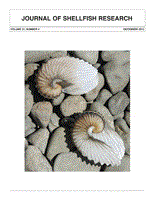The effect of periods of preslaughter fasting on muscle quality and digestive enzyme activity of farmed whiteleg shrimp Litopenaeus vannamei was investigated. The fasting periods for the control, treatment 1 (T-1), and treatment 2 (T-2) groups were 0, 1, and 2 days, respectively. Higher compositions (P < 0.05) of crude protein and crude fat were observed between the control and T-2 groups. In addition, there was significant difference in crude fat between treatments T-1 and T-2. With regard to pH, total volatile basic nitrogen, and K value, no significant differences were detected across all groups; however, significant differences (P < 0.05) were obtained in hardness, springiness, and chewiness of shrimp muscle between the control and T-2 groups. According to the results of total viable counts, preslaughter fasting was most effective at controlling the growth of microorganisms. A significant difference was also observed (P < 0.05) in protease and lipase activities between the control and T-2 groups, which indicated that the 1-day fasting period prior to slaughter could firm muscle texture, increase enzyme activities, improve fat deposits, and decrease microbial growth of whiteleg shrimp, thus improving muscle-quality attributes of the whiteleg shrimp.
How to translate text using browser tools
1 August 2013
Effect of Preslaughter Fasting Periods on Muscle Quality and Digestive Enzyme Activity of Farmed Whiteleg Shrimp Litopenaeus vannamei
Xu-Xia Zhou,
Fei Lu,
Yu-Ting Ding
ACCESS THE FULL ARTICLE

Journal of Shellfish Research
Vol. 32 • No. 2
August 2013
Vol. 32 • No. 2
August 2013
digestive enzyme
Litopenaeus vannamei
muscle quality
preslaughter fasting
whiteleg shrimp




